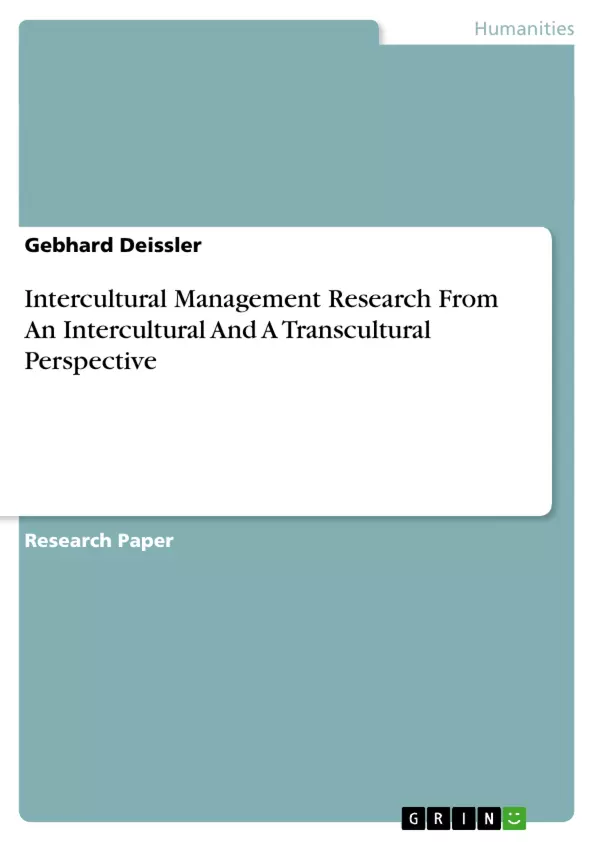This research upgrades the intercultural paradigm by the transcultural paradigm in a consistent way that enables and facilitates global processes in the diverse domains that require effective management at a planetary scale.
Inhaltsverzeichnis (Table of Contents)
- Part 1
- The Intercultural Perspective
- A. Introduction to three Global Business Cases
- 1. 'Anglo-German Business Communication'. A Research Report
- 2. ‘Chinefarge': A Sino-French Joint Venture Research Report
- 3. 'The Amber Team': A global Business Team Research Report
- Part 2
- The Transcultural Perspective
- A. The Intercultural Complementarity Principle
- B. The Intercultural Integration Principle: A Review of the Intercultural Paradigm
- 1. The State of the Intercultural Art and Science: On Human Relativity in Intercultural Research
- 2. Enhancing the Intercultural Art and Science: Sources, Models and the Achievement of Supreme Cultural Intelligence
- C. Expanding Human Culture Consciousness
- 1. Physiological Aspects of Culture Consciousness and its Management
- 2. The 'Culture-Cosmic Computer'
- 3. The Cosmic Dimension of Global Diversity Management
- 4. Reconciling Planetary Diversity through Transcultural Management
- 5. A Third Millennium Global Civilisation Formula: Integrating the Relative and the Absolute
- 6. Metropolism - Cosmopolitanism - Cosmism
- 7. Dimensions of ONE
- 7.1 The Magic of the ONE: The One as the Regulator of Unity And Diversity
- 7.2 Summum Unum: The Diversity Of Life
- 7.3 Ut Unum Sint
- Part 3
- Inter- and Transcultural Awareness-Based Intercultural Interfacing Techniques
- Part 4
- Bilingual Intercultural & Transcultural Consciousness-Based Management Terminology: English-German
Zielsetzung und Themenschwerpunkte (Objectives and Key Themes)
This research explores the complexities of intercultural and transcultural management, highlighting the challenges and opportunities presented by a globalized world. The text delves into various aspects of intercultural communication, cultural intelligence, and the development of a global civilization formula. * **Intercultural Communication and Management:** The book analyzes real-world scenarios and research reports to understand the nuances of intercultural communication and its impact on business practices. * **Cultural Intelligence and its Development:** The text explores various models and approaches to developing cultural intelligence, emphasizing the importance of understanding different cultural perspectives and navigating diverse environments. * **The Transcultural Perspective:** The author introduces the concept of a "transcultural perspective," moving beyond simple intercultural comparisons and emphasizing the interconnectedness of cultures and the potential for a unified, yet diverse, global civilization. * **Cultural Consciousness and its Management:** The research examines the physiological aspects of culture consciousness and its role in effective intercultural and transcultural management, exploring the role of cultural understanding in individual and organizational success. * **Reconciling Diversity:** The text explores strategies for managing diversity across cultural boundaries, aiming to reconcile planetary diversity through transcultural management and a shared global civilization formula.Zusammenfassung der Kapitel (Chapter Summaries)
Part 1 introduces three global business cases: "Anglo-German Business Communication", "Chinefarge", and "The Amber Team." These case studies provide real-world examples of intercultural challenges in international business environments. Part 2 focuses on the transcultural perspective. It introduces the "Intercultural Complementarity Principle" and the "Intercultural Integration Principle," outlining the importance of integrating different cultural perspectives to achieve a more holistic understanding of human behavior. The chapter also explores the "Culture-Cosmic Computer" and its implications for global diversity management. Part 3 focuses on practical techniques for intercultural interfacing, drawing from the knowledge and principles established in the previous sections. Part 4 provides a bilingual glossary of intercultural and transcultural management terminology, offering a resource for practitioners and researchers working in diverse contexts.Schlüsselwörter (Keywords)
The main keywords of this text include intercultural management, transcultural management, cultural intelligence, global civilization, cultural consciousness, diversity management, intercultural communication, cultural relativity, and the "Culture-Cosmic Computer." These terms represent the core focus of the research, exploring the multifaceted nature of culture and its implications for individual and organizational success in a globalized world.Frequently Asked Questions
What is the difference between intercultural and transcultural management?
The research upgrades the intercultural paradigm (comparing cultures) with a transcultural perspective, which emphasizes interconnectedness and global processes on a planetary scale.
What is "Cultural Intelligence" in a global business context?
It is the ability to understand, integrate, and effectively manage diverse cultural perspectives to facilitate successful global communication and cooperation.
What are the three global business cases discussed?
The cases include "Anglo-German Business Communication," a Sino-French joint venture called "Chinefarge," and a global team project known as "The Amber Team."
What is the "Culture-Cosmic Computer"?
It is a conceptual model used in the research to describe the cosmic dimensions of global diversity management and human culture consciousness.
How can planetary diversity be reconciled?
The author proposes a "Global Civilisation Formula" that integrates relative cultural differences with absolute human values through transcultural management techniques.
- Citation du texte
- D.E.A./UNIV. PARIS I Gebhard Deissler (Auteur), 2012, Intercultural Management Research From An Intercultural And A Transcultural Perspective, Munich, GRIN Verlag, https://www.grin.com/document/190664



